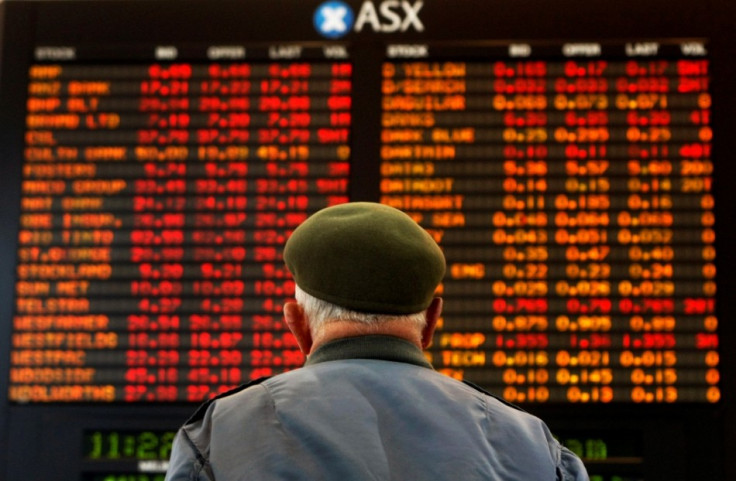Asian Markets Outside Japan Hit By Renewed Federal Reserve QE Taper Fears

Most Asian markets traded lower on 21 November, as worried investors reduced their purchases, after the US Federal Reserve's latest minutes revealed that the central bank could trim its bond purchases "in the coming months".
However, Japanese equities bucked the trend on news that the nation's $2tn of pension funds will be invested in stocks and other riskier assets.
The Japanese Nikkei finished 1.92% higher or 289.52 points at 15,365.60.
India's BSE Sensex was trading 1.62% lower or 333.52 points at 20,301.61.
South Korea's Kospi finished 1.16% lower or 23.46 points at 1,993.78.
Australia's S&P/ASX finished 0.37% lower or 19.40 points at 5,288.30.
Hong Kong's Hang Seng was trading 0.36% lower or 86.36 points at 23,614.50.
The Shanghai Composite finished 0.04% lower or 0.85 points at 2,205.77.
The minutes of the Fed's October policy meeting indicated that the world's most powerful central bank proposes to start tapering its massive asset buyback programme in the "coming months".
The participants in the meeting "generally expected that [incoming] data would prove consistent with the [FOMC's] outlook for ongoing improvement in labour market conditions and would thus warrant [the] trimming the pace of purchases in [the] coming months."
Meanwhile, James Bullard, president of the St Louis Federal Reserve Bank, said the Fed would begin to scale back its $85bn-a-month bond buying stimulus at its meeting in December, given that labour market data for November was strong.
"It is definitely on the table, but it is going to depend on the data," Bullard said.
"A strong jobs report, I think, would increase the probability of a December taper," he added.
UniCredit Research said in a note to clients: "We stick to our view that tapering starts in 1Q14, with January being our baseline scenario. Our expectation is also that the Fed will at the same meeting announce to lower the unemployment rate threshold in its forward guidance to 6% from the current 6.5%".
"While [20 November's] minutes reveal that such a change has been discussed at the October meeting - and is being supported by at least some FOMC members - the odds for such a step now seem lower than before."
"Concerns that changing the unemployment threshold might undermine the credibility of the forward guidance has led several FOMC members to look for alternatives, including cutting the interest on excess reserves," UniCredit added.
Commerzbank Corporates and Markets said in a note to clients: "Fed chairman Bernanke explained and defended US monetary policy in an interesting speech [on 19 November]. The thrust of his arguments confirmed the widely held view that the Fed will rather do more than less when in doubt."
"By punching holes into the 'threshold level' of a 6.5% unemployment rate, Bernanke obviously indicates that the Fed will not tinker with the threshold for the time being."
"In our view, QE3 is currently the main signalling device of the Fed - which puts the risk for the timing of tapering squarely into the later category," Commerzbank added.
Meanwhile, in China, data showed that the country's factory activity slowed in November, partly because of a decline in export orders.
Preliminary results from a monthly HSBC/Markit survey showed that the manufacturing Purchasing Managers' Index (PMI) slipped to 50.4, against a final reading of 50.9 in October.
Elsewhere, the Bank of Japan left its ultra-loose monetary policy unchanged and restated that the world's third-largest economy was moderately recovering.
Wall Street Down
On Wall Street, indices ended lower on Fed concerns.
The Dow finished 66.21 points lower or 0.4% at 15,900.82.
The S&P 500 ended 6.5 points lower or 0.4% at 1,781.37 while the Nasdaq ended 10.28 points lower or 0.3% at 3,921.27.
Tim Radford, global analyst at Rivkin Securities said in a note to clients: "While the Fed's communication to the market hasn't really changed, market participants still responded negatively, with bond yields rising, the US dollar strengthening, precious metals tumbling, and equities slipping."
Company Stock Movements
In Tokyo, telecoms major KDDI jumped 6.3% while rival Softbank added 3%.
In Shanghai, Citic Securities fell 3%.
New China Life Insurance dropped 3.2% on news that Zurich Insurance would exit the Chinese firm, selling its remaining shares for $943m.
In Mumbai, ITC, the nation's biggest tobacco company, dropped 2.4%.
In Sydney, gold miner Evolution Mining dropped about 9% while rivals Alacer Gold and Kingsgate Consolidated lost 6% each, after gold prices fell to a four-month low.
In Seoul, index heavyweight Samsung Electronics lost 2%.
© Copyright IBTimes 2025. All rights reserved.






















